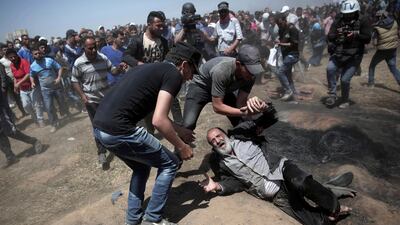The drones hovering high above the demonstrations along the fence that separates Gaza from Israel buzz throughout the day, invisible eyes in the sky, observing the commotion below.
Behind dirt barriers, Israeli snipers watch through their scopes as groups of young Palestinians set fire to piles of tyres close to the fence. Occasionally, military jeeps dart out from behind the barriers to shoot volleys of tear gas.
After Monday’s carnage, Tuesday was tame. Palestinian medical sources reported that Israeli troops had killed only two protesters, compared to at least 60 the day before.
While these protests were about the Trump administration's decision to recognise Jerusalem as the capital of Israel, the root causes go much deeper.
Few of Gaza's two million inhabitants have ever escaped the Strip's narrow confines. Unemployment among the young hovers around 50 per cent. Power cuts are long and unpredictable, the tap water salty and undrinkable. Life grinds on with little prospect of change. It only seems to get worse.
_______________
Arab League calls emergency meeting on Palestine
_______________
Gaza, in the words of the former British prime minister David Cameron, is a prison camp, and the inmates are rioting, again.
Tuesday marked the 70th anniversary of what Palestinians call Al Nakba - "the catastrophe" - when they lost their homes to the new state of Israel. Al Nakba refers to 1948, but Palestinians will readily tell you that the catastrophe started that day, but never ended.
Short-sighted leaders and unreliable allies have turned that day into decades. The pain appears even worse today by the realisation that even those who once paid lip service to their cause have gone silent.
The US administration, which in days past would couple its statements about Israel's right to self defence with calls for restraint, no longer calls for restraint.
The Palestinians are now left to their own devices, and all they have left are protests like those of Monday, and their bloody consequences.
______________
Read more
Arabs condemn Israeli 'massacre' of Palestinians
Israel kills dozens in Gaza as US moves embassy to Jerusalem
______________
In this bleak landscape, the tiniest victory is cause for celebration. The high point of Tuesday came when Hamas militiamen armed with AK-47 assault rifles managed to shoot down an Israeli drone while it was spewing canisters of tear gas on to protesters. The demonstrators whooped, cheered and whistled as the drone crashed to the ground.
It was a rare pin prick in the enemy's high-tech armour. This tiny triumph spurred one last wave of protesters toward the fence, but not too close. It was getting late, the sun was setting, and soon the crowd thinned out. It was time to go home.
Ben Wedeman is a Senior International Correspondent for CNN in Gaza City

